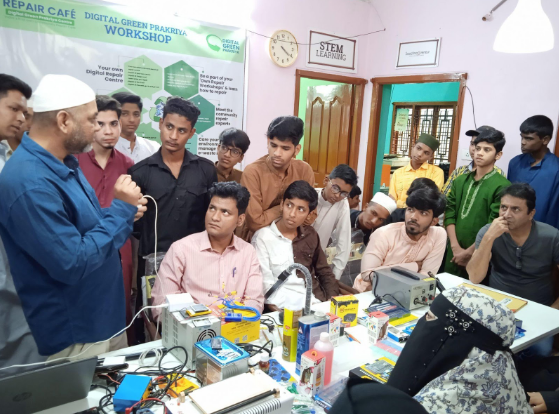Hey there, tech explorers! Ever wondered about the gadgets that surround us? Imagine a world where you could talk to someone on the other side of the planet with a tap, play games that whisk you away to imaginary lands, and even learn new things while dancing with emojis! That is the world of electronic devices—the coolest companions in our digital adventure.

But there is another side to these gadgets. If we lined up all the gadgets on Earth, they would outnumber us humans! We have manufactured so many gadgets to make our lives convenient that in the process of manufacturing them, we have harmed our planet and made it feel a bit too warm.
Given this situation, a bunch of tech heroes from the Digital Empowerment Foundation (DEF) thought of a super idea. They have set up a special place where they teach people how to fix their gadgets instead of throwing them away. The two super cool Repair Centers developed by the DEF are the best places for anyone who wants to learn how to be a gadget hero. And these centers are so popular that even big gadgets like TVs are getting a makeover there.
But that is not all—the DEF is like a wise old owl. They know that we cannot do this superhero work alone. So, they are teaching whole communities how to be tech wizards. They believe in teamwork, and together, they are making sure we all learn the power of fixing, reusing, and being kind to our planet.
Syed S. Kazi, a senior consultant at DEF, said, "We know that our community is amazing, and we wanted to show them how they can save the world with their gadget skills!"
Fighting E-Waste, One Community at a Time
DEF is like a cool teacher, showing communities how e-waste can harm our planet and teaching them about the "circular digital economy." Sounds fancy, right? It means we can use our gadgets wisely and make sure they do not become waste.
Meet Tuisha Sircar, a real-life hero, who teamed up with the DEF to make this adventure happen. They picked two places, Chanchalguda locality in Hyderabad city (Telangana state) and Tain village in Haryana’s Nuh district, to start their mission. They set up repair centres where anyone can learn to fix their gadgets.
A Quest to Spread Awareness
Before the adventure began, the DEF did some excellent research. They found out that many people did not know about fixing and reusing gadgets. The initial step involved establishing a DGP repair center in both locations, considering input from the communities to ensure easy access for residents.
Before embarking on the project, the DEF conducted research to assess needs of the communities. A need was identified: lack of awareness among community members about the significance of repair and reuse. Additionally, the study highlighted limited understanding of e-waste production and its connection to environmental degradation and sustainability. They also learned about e-waste, the bad stuff that happens when we do not recycle gadgets. So, they decided to teach everyone about it!
Moreover, the lack of repair services in both Chanchalguda and Nuh presented a perfect opportunity for DEF to create "repair cafés" – special places where people could gather with tools and resources for learning. In Chanchalguda, a skilled trainer named Rizwan joined the team to offer affordable repair services and teach valuable repair skills to the community. Rizwan shared, "After every workshop, the students were curious and excited to learn about the tools and repair techniques. They are eager to understand how to fix things and help reduce e-waste in our community."
Adding to the effort, the project team went from door to door, spreading awareness about the initiative. They also organised events to collect old electronic devices and held engaging workshops that covered a range of practical topics.
These workshops were not just about talking; participants got to roll up their sleeves and try their hand at fixing things. They learned how to rescue water-damaged gadgets, revive batteries and chargers in mobile phones, tackle issues with hard disks, understand and use software, and even repair circuit boards.
Tuisha Sircar, a key member of the project, shared, "Through our pilot program, we took important steps to unite the community, make them more informed. We used both fun and informative methods, like hands-on workshops, to help people become better at fixing and reusing their digital devices, all on their own."
Empowering Young and Old Alike
This innovative pilot project reached out to 60 people and around 30 homes in two different places. Kids and grown-ups, everyone joined in – the youngest was just 15 years old! Even older folks wanted to be part of the fun. They asked, "Can we join too?"
The Power to Fix and Save
The project is not just about fixing things; it is about changing how we see the world around us. By learning how to take care of our devices and the environment, we are building a better future for ourselves and generations to come.
"In the grand scheme of things, the program is poised to catalyze not only a profound transformation in the cultural and behavioural fabric of communities but also to pave the way for the emergence of new pathways towards additional endeavours in environmental sustainability and justice," Kazi envisaged.
With this special project, communities are transforming themselves into repair experts. They are becoming champions at fixing things, and that is making a big difference. "We're learning to take care of our devices and our planet," said Tuisha Sircar. She added, "We are building a world where we are smarter about using technology, and that's amazing!"
So, remember – the next time your phone or computer acts up, you might just have the power to fix it, thanks to these repair heroes!
Leave A Comment